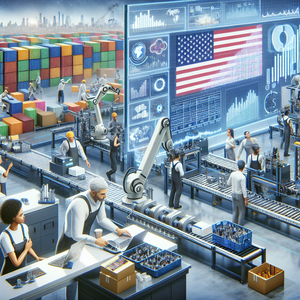The Future of Manufacturing: How Entry-Level Machine Operators Are Adapting to Automation

The integration of automation in manufacturing processes has led to an increased demand for machine operators who can work alongside sophisticated machinery. Traditional roles are shifting from manual operation to more technical positions that require a deeper understanding of automated systems. For instance, entry-level machine operators are now expected to monitor automated processes, troubleshoot issues, and perform routine maintenance on complex machinery. A study by the International Federation of Robotics indicates that the number of industrial robots in use has been steadily rising, with predictions that this trend will continue. This shift means that entry-level machine operators must become adept at operating, programming, and maintaining these robots to remain relevant in the industry.
Essential Skills for the Future
To thrive in an automated manufacturing environment, entry-level machine operators must develop a new skill set. Key skills include: 1. Technical Proficiency: Understanding how to operate and troubleshoot automated equipment is crucial. Training programs that focus on robotics, computer numerical control (CNC) machines, and programmable logic controllers (PLCs) are highly beneficial. For example, many community colleges and vocational schools now offer specialized courses aimed at developing these competencies. 2. Analytical Skills: With automation comes the need for data analysis. Operators must be able to interpret data from machines to optimize production processes and identify potential issues before they escalate. Companies are increasingly utilizing data analytics tools to monitor machinery performance, and operators must be trained to use these tools effectively. 3. Adaptability: The manufacturing landscape is continuously evolving. Entry-level machine operators must be willing to learn new technologies and processes as they emerge, demonstrating flexibility in their roles. This adaptability is essential as manufacturers implement new systems and technologies to stay competitive. 4. Collaboration: As automation often requires teamwork, operators must be effective collaborators. They need to work closely with engineers, data analysts, and other team members to ensure that automated systems are functioning optimally. Firms are increasingly fostering collaborative environments, encouraging cross-disciplinary teams to tackle challenges together.
Supporting Examples and Evidence
Several companies have successfully integrated automation into their operations while emphasizing the importance of training their workforce. For instance, Bosch, a leading global supplier of technology and services, has implemented comprehensive training programs for their machine operators. These programs focus not only on the technical skills needed to operate automated machinery but also on soft skills that enhance teamwork and communication. Moreover, organizations like the National Institute for Metalworking Skills (NIMS) offer certifications that help entry-level machine operators gain the necessary skills to work with automated equipment. These certifications signal to employers that candidates are well-prepared for the demands of modern manufacturing. Such initiatives are critical in ensuring that the current workforce is equipped to handle the ongoing changes in the industry.
The Future Landscape of Manufacturing
The future of manufacturing will undoubtedly be shaped by automation. As machine operators continue to adapt to these changes, their roles will become increasingly vital. Industries will rely on skilled operators who can not only manage automated processes but also contribute to continuous improvement and innovation. Furthermore, the demand for skilled labor in manufacturing is expected to grow. According to the Bureau of Labor Statistics, jobs in manufacturing are projected to increase, particularly for those who possess advanced technical skills. This trend hints at a promising future for entry-level machine operators who embrace automation as an opportunity rather than a threat. Moreover, as companies look to improve efficiency and reduce costs, the role of machine operators will shift toward higher-value tasks, such as process optimization and quality assurance. This shift will require a workforce that is not only skilled in technology but also capable of critical thinking and problem-solving.
The evolution of entry-level machine operators in the face of automation presents both challenges and opportunities. By embracing new technologies and acquiring essential skills, these operators can secure their place in the future of manufacturing. As the industry continues to evolve, the adaptability and technical proficiency of machine operators will be critical in driving innovation and efficiency. Ultimately, the success of the manufacturing sector will hinge on its ability to empower its workforce to thrive in an increasingly automated world. As manufacturers and workers alike recognize the importance of continuous learning and skill development, the future looks promising for those willing to adapt to the changing landscape of manufacturing.
CNC Machine Operator
Aerospace manufacturers, automotive companies, precision engineering firms
Core Responsibilities
Set up and operate CNC machines to produce precision parts and components.
Interpret technical drawings and blueprints to ensure accurate machining processes.
Perform routine maintenance and troubleshooting on CNC equipment.
Required Skills
Proficiency in reading technical schematics and understanding CNC programming.
Experience with CAD/CAM software for designing machining processes.
Attention to detail and strong problem-solving skills.
Robotics Technician
Automation companies, large manufacturing plants, technology firms
Core Responsibilities
Install, maintain, and repair robotic systems used in manufacturing processes.
Program robots for specific tasks, ensuring optimal performance and efficiency.
Collaborate with engineers to design and implement new robotic solutions.
Required Skills
Knowledge of robotic programming languages (e.g., ROS, Python).
Understanding of electrical and mechanical systems as they pertain to robotics.
Strong analytical skills to troubleshoot and optimize robotic operations.
Industrial Maintenance Technician
Manufacturing facilities, food processing plants, chemical production companies
Core Responsibilities
Conduct preventive and corrective maintenance on manufacturing equipment and machinery.
Diagnose equipment failures and implement solutions to minimize downtime.
Maintain detailed records of maintenance activities and repairs.
Required Skills
Familiarity with PLCs, hydraulic systems, and mechanical troubleshooting.
Strong mechanical aptitude and experience in industrial environments.
Ability to work collaboratively with production teams to ensure seamless operations.
Quality Assurance Inspector
Electronics manufacturers, automotive suppliers, consumer goods companies
Core Responsibilities
Inspect and test products and components to ensure they meet quality standards.
Develop and implement inspection protocols and procedures.
Document inspection results and collaborate with production teams to address quality issues.
Required Skills
Strong attention to detail and familiarity with quality control methodologies.
Knowledge of statistical process control and quality assurance software.
Effective communication skills to report findings and recommendations.
Data Analyst for Manufacturing Operations
Manufacturing firms, supply chain companies, consulting firms specializing in operations management
Core Responsibilities
Analyze data from manufacturing processes to identify trends and areas for improvement.
Collaborate with machine operators and engineers to optimize production efficiency.
Develop dashboards and reports to communicate findings to stakeholders.
Required Skills
Proficiency in data analysis tools (e.g., Excel, Tableau, SQL).
Understanding of manufacturing processes and key performance indicators (KPIs).
Strong problem-solving skills and the ability to interpret complex data sets.


